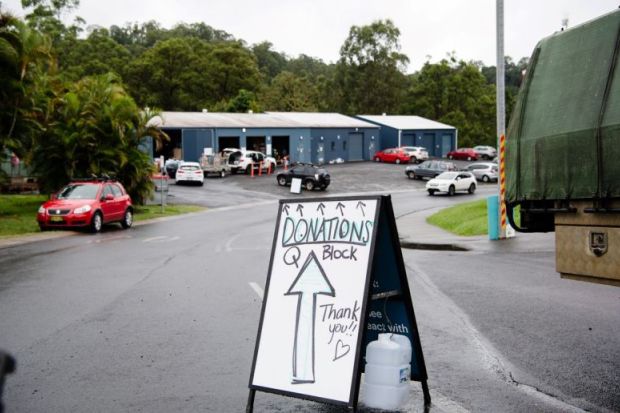Southern Cross University has become a “centrepiece” of rescue and recovery efforts across the flood-ravaged New South Wales north-east, with its Lismore campus – largely untouched by the record inundations that destroyed the town’s centre – hosting services from medics, police and soldiers to insurance assessors and local politicians.
Over 1,000 high school students have relocated to the campus from the riverside Trinity Catholic College, with peers from the nearby Living School set to follow suit. It is the latest neighbourly act from a university that has hosted evacuees since the early hours of the disaster, with around 1,500 people sheltering on the campus at one stage, and whose academics performed dozens of rescues at the height of the emergency.
SCU said a medical centre had been established to treat flood evacuees, with a mobile vet on hand to attend to rescued pets. Hundreds of tonnes of donated goods are being processed at a distribution centre on campus, to be shared among flood victims.
Lismore Police has relocated its headquarters to the SCU campus and the Australian Defence Force has set up camp on the university tennis courts, with helicopters using the rugby ovals to ferry evacuees and supplies.
“It’s a community emergency,” said vice-chancellor Tyrone Carlin. “We look out for each other. Being able to offer high ground, teaching facilities and the right infrastructure to help high school students return to their studies is central to our mission.”
While the flood damaged thousands of homes and engulfed multiple-storey buildings in Lismore’s centre, the SCU campus – which has been largely empty since mid-2021, due to Covid-19 lockdowns – was spared thanks to its elevated location in the town’s east.
University administrators decided to defer the planned resumption of face-to-face classes until at least May, to free up space for recovery efforts. The campus now hosts five recovery hubs focused on emergency services, business, legal support, banking and volunteering.
Writing in the Campus Morning Mail newsletter, SCU chief marketing officer Dean Gould said the banking hub had given evacuees access to cash for the first time since the floods overwhelmed Lismore’s automatic teller machines.
The legal hub was helping people and businesses with insurance and tenancy issues, among other matters, while the community-run Resilient Lismore initiative was using the campus as a base to distribute resources like cleaning supplies and personal protective equipment for a recovery effort expected to last months.
The university has also launched a flood appeal to help flood-affected students buy textbooks, laptops and other equipment. It said it was rolling out financial and non-monetary aid, but community donations would help.
“Some students have lost their homes, their cars and all their belongings,” it said. “[Others] have had their immediate families and support networks severely impacted.”
Mr Gould said assistance in natural emergencies was “not mentioned” in the university act or the higher education regulator’s assessment criteria. “But it is a role that is central to the university’s purpose, to its soul and to its community.”





